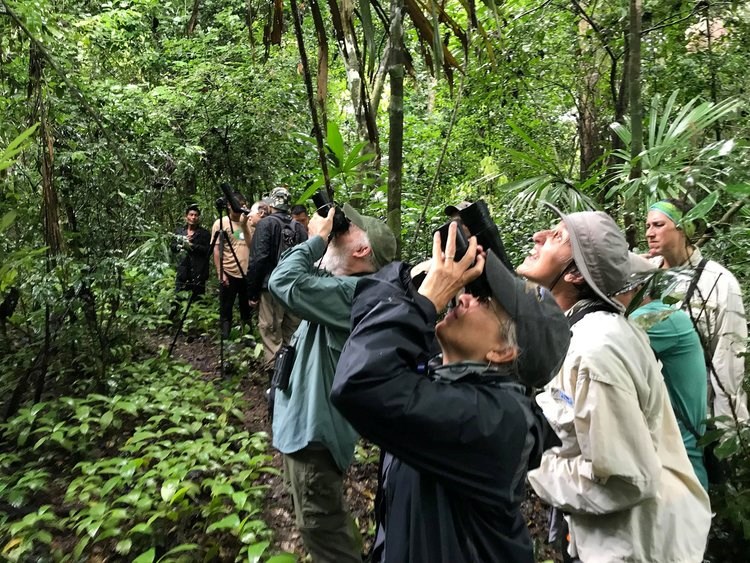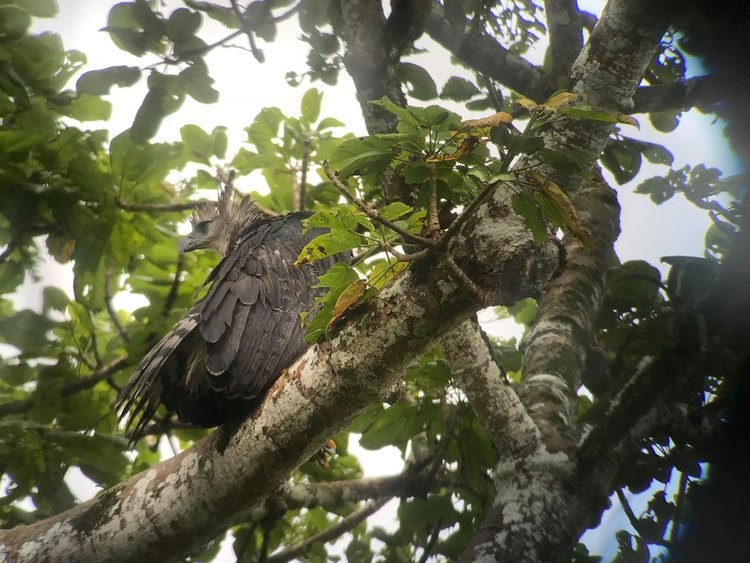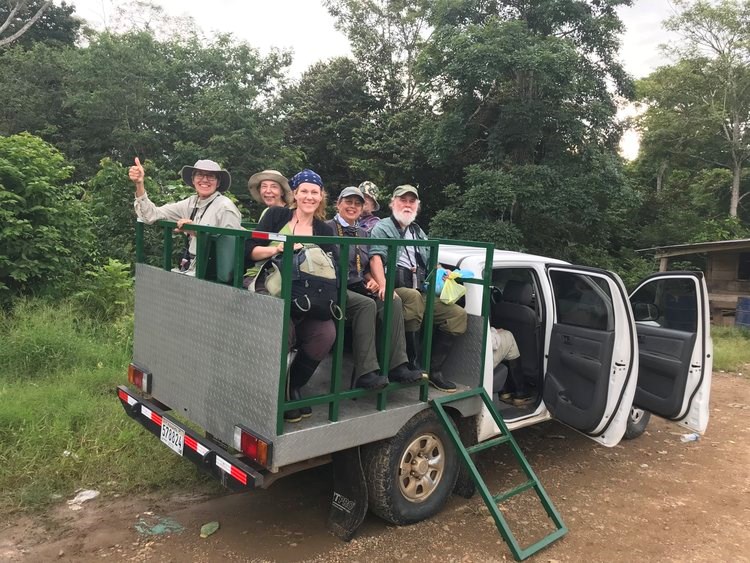Please Pass the Machete: The Quest for the Harpy Eagle
Posted on in In the Field by Jamie Dawson, EducatorJamie Dawson, Educator
It was dark in the thick Panamanian jungle, well before dawn. Before the howling monkeys rustled the vine-choked trees, the magical blue morpho butterflies flitted between flowers, and long before the creatures of the rainforest awoke to begin their daily balance of finding food without becoming food, gringos were stirring deep in the Darien, where the wild has not yet been tamed by man. They were a venturing on this mysterious Central American journey and forever bound in fellowship forged by the quest for the elusive harpy eagle.
We loaded into our trusted van and excitedly sunk into our familiar seats, clutching dirty daypacks laden with our gear, water, and most importantly, copious amounts of dove chocolate. Fueled by strong coffee and the anticipation of fulfilling lifelong harpy dreams, we silently drove through the darkness.

Eventually our vehicle turned onto an unpaved dirt road, where two hardcore pickup trucks, seemingly straight out of Jurassic Park and decked out for off-roading safaris, were waiting to transport us to the next leg of our journey…the Chucunaque River. After rousing bumps and jolts, we arrived at the rural riverbank port cloaked in light rain, just as sun began to rise. There in the brown river floated our awaiting riverboat queens: two long, dugout canoes. After cautiously boarding, our canoe captains launched us down the longest river in Panama towards secluded harpy nesting grounds on the outskirts of the remote Sinai village.
It was raining. We sat completely exposed to the elements without reprieve, as the water pelted us relentlessly for the entire three hour boat ride. I never expected to be cold in Panama. Furtive glances downstream revealed large flocks of disgruntled ibis dispersing in unison to escape the annoyance of our approaching vessels. Only one thought kept my chilled, rain-drenched despair at bay—chocolate. I watched the misty trees pass by and imagined the pleasure of gorging myself with the dove chocolates, tucked safely in my pack, upon reaching our destination.
Never has such an indomitable concentration of raptor enthusiasm been captured in quite delightful Argentinian form as our fearless leader, Sergio Seipke of Raptours. We left our canoes and followed Sergio through the thick banana fields, down the narrow trail carved out of the encroaching jungle. We had been given firm orders to strictly adhere to the trail and remain focused on the pursuit, as we were on a time-sensitive mission. Like a kid in a candy store, it took all of my willpower to resist the temptation to stop and explore the cornucopia of tropical life engulfing the trail.

With adept grace, our machete-wielding guides escorted us through deep, swiftly flowing streams as we pushed further into the lush heart of the forest. Finally, after mud, sweat, toil, and water-filled “water-proof” boots, we emerged victoriously to a small clearing hidden beneath the thick canopy. Draped in low-hanging, camouflaged netting and dappled with light and shadow, our eyes fell in awe on a majestic ceiba tree, prominently the highest point in the green expanse of the forest. Boasting superior views, the ceiba presents prime realty for nesting harpies, as few predators can summit the smooth, immense trunk.
There it was at last, the harpy nest! Thick layers of strategically intertwined sticks lay nestled high in the ceiba canopy. With necks craned towards the clearing sky, we eagerly scanned the nest area for signs of the raptor residents. As the tense moments melted into minutes, our hopeful anticipation transformed into awkward disappointment; the harpies were nowhere to be seen. Despite our valiant efforts, we knew this unwanted outcome was always a possibility.

But then, a large feather-crested head slowly emerged above the nest. To our astonished delight, the female harpy leisurely perched on an open branch, carefully preening and drying her feathers in the sun. The harpy’s mystical, whistle-like calls pierced the still, humid forest air, and her powerful wings shook rhythmically from the effort. Our guides quietly explained to us that she was calling for her mate to bring food. Mesmerized and elated by this privileged glimpse, we realized that the morning rain was truly a blessing. If the harpy hadn’t been wet from the early rain, she may not have left the security of her nest to dry off in the open sun.
I could have watched the harpy forever, but the time had come to depart. We didn’t want our presence to deter the male harpy from returning to the nest with food, and we had a long journey back to our lodge, best made in daylight. I indulged myself with one last look through my binoculars and reluctantly pulled away from the blind to follow our group back to the canoes.

I’m no navigational genius, but somehow the trail looked different on the way back. I was sure we must have made a wrong turn, as our jungle trail was nowhere to be seen, and instead we carefully trudged through turbulent, waist-high water swiftly coursing its way through the understory. A flash flood had overtaken the region, and the water level of the river had risen over twelve feet in two hours. With this realization, a new heightened urgency hustled us to our canoes to depart while we still could.
I stared incredulously at the swollen river. The canoes had been carried far inland by the rising water and were nowhere near where we had left them. Sediment, logs, and thick debris choked the fast moving current. We bravely boarded our canoes and braced ourselves for the perilous homeward journey. The air was tinged with electric excitement, as we straddled the thin line between adventure and real potential danger. The furrowed brows and distressed faces of our captains revealed the seriousness of our circumstances. Our reflexes were tested as we instinctively leaned into turns and quickly ducked under rapidly approaching riparian branches, hanging just inches above our canoe seats.
At one point, we lost control as our canoe motors became tangled and clogged with debris. “Please pass the machete!” said one of the captain’s assistants who, against our protests, proceeded to jump out of the moving boat and scramble across the swirling, floating logs to cut away the debris from the motor. Entire unearthed trees swept past us ominously in the floods. I began to look around at my companions and silently assess their swimming abilities. Who would be able to survive and fend for themselves if we were to capsize?
Finally, the motor was freed and we were moving again! But, wait - what was happening now? Our boat was moving backwards, and we were slowly reversing upstream, dodging collisions with oncoming hazards carried by the current. Utterly confused and equally concerned, I asked the captain in Spanish what was going on. Apparently, the captain’s jacket that contained the cash payments for the entire crew must have been snagged and caught on a branch, as it was now missing. So the captain logically informed me that we were now going back upstream in attempt to locate his lost jacket with the money. The group exchanged worried glances, and the HMS passengers called an emergency team meeting. We decided to pool our collective cash to replace the captain’s lost wages to avoid the unnecessary risk of traveling upstream. However, just as we were about to reveal our mutiny to the captain, against all odds, the missing jacket was spotted in the water. There it was, barely visible, caught on a branch submerged beneath the surface. The captain reached into the water, fervently pulled the soaking jacket until it snapped off the branch, unzipped a drenched pocket and triumphantly clutched a fat wad of dripping cash.
After an exhilarating trek back down the river, the HMS passengers are back on land.

Relieved to safely return to our port of origin, we disembarked our canoes in high spirits, cohesively bonded by the intense shared experience. The adventure continued as we mounted the open backs of the safari trucks for a bumpy bird-watching sunset ride. Delirious with fatigue and soaring on natural highs, Karen and I enthusiastically waved and yelled friendly “hellos” from the back of the truck as we passed by groups of children, and chickens, from the village. It had been, by far, one of the most amazing days of my life, made even more special by the humorous camaraderie and cherished friendships. It was truly unforgettable.